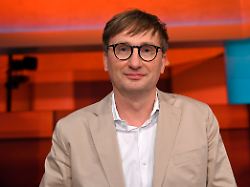NATO summit with Markus Lanz
“War is about fighting, killing and dying”
By Marko Schlichting
7/12/2023 4:46 am
Turkish President Erdogan wants to support Sweden’s NATO membership, it was said at the beginning of the Vilnius summit. Military expert Sönke Neitzel speaks of a surprise at Markus Lanz. In addition, Pistorius’ plans with the Bundeswehr in the Baltic States and cluster munitions for the Ukraine are topics of the panel discussion.
The two-day summit of NATO member states began on Tuesday in the Lithuanian capital, Vilnius. And immediately there was the first success: Turkish President Erdogan wants to support Sweden in entering the defense alliance. That was a surprise for the military historian Sönke Neitzel, he says on the ZDF talk show Markus Lanz, in which the guests talk about the summit, among other things.
Neitzel believes that Erdogan originally wanted to make his support dependent on accession talks with the EU. Did Erdogan perhaps even blackmail the EU? No, Pioneer Editor-in-Chief Michael Bröcker clarifies in the same program. He had a conversation with the Turkish ambassador in Berlin on Tuesday. He told him that Erdogan had only expressed the wish that Turkey could become a member of the EU. In his new term of office, Erdogan wants to get closer to the EU and distance himself from Russian President Vladimir Putin. “In Sweden he has a partner who will have to fight for Turkey in the next few years,” said Bröcker. For his approval, the Turkish President initiated discussions about a customs union and visa-free travel for Turkish immigrants.
German troops in the Baltics bang
Neitzel recalled that US President Joe Biden also promised Turkey the delivery of F16 fighter jets. “It’s good for NATO that Sweden is part of it,” explains the military historian. Sweden has a strong navy while Finland has a well-equipped army. Since Russia occupied Crimea in 2014, NATO has been considering how to defend the Baltic states in the event of a Russian attack. “With the accession of Finland and Sweden, the geostrategic situation is now much better,” said Neitzel.
The announcement by Federal Defense Minister Boris Pistorius to station 4,000 soldiers in the Baltic States was a sensation. Neitzel: “An important political step, and I would argue that for military reasons too. Pistorius has to give that credit to him. Germany is in front of the wave. I think that’s a positive thing.”
cluster munitions for Ukraine
The US announcement that it would supply cluster munitions to Ukraine has met with mixed reactions. These are explosive devices that divide into small explosive devices and can thus cover a relatively large area. However, only part of it explodes, about 30 to 40 percent of the small projectiles remain as duds. It is therefore dangerous to enter the area after using cluster munitions. 110 countries have outlawed the use of cluster bombs, including Germany. The USA, China, Russia and Ukraine are not among them.
For Neitzel, the use of cluster bombs in the Ukraine war is relatively unproblematic. Both Russia and Ukraine have already used them. “Ukraine is fighting for its survival. And the war is not yet decided. The question is whether the Ukrainian state will still exist in two years. Ukraine is trying to break through the Russian defenses, the ammunition can help with the trench systems. That’s why I would have a hard time banning Ukraine from using cluster bombs.” A war is about fighting, killing and dying, says Neitzel. “There is no such thing as a good war.”
And at the end of the program, the Russian human rights activist Irina Scherbakowa wishes that Ukraine had to show some successes. Then the “man-eating era” that began under President Vladimir Putin could also come to an end in Russia. The co-founder of the Russian human rights organization Memorial says to Lanz: “Ukraine didn’t lose the war as a state. We don’t know what victory will look like. But Ukraine hasn’t lost the fight for independence yet.”
